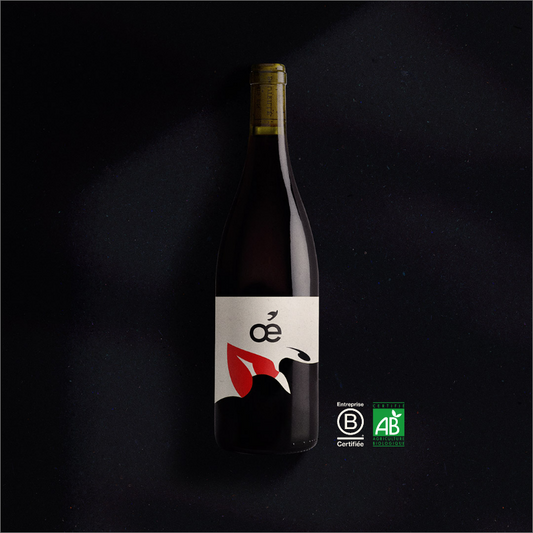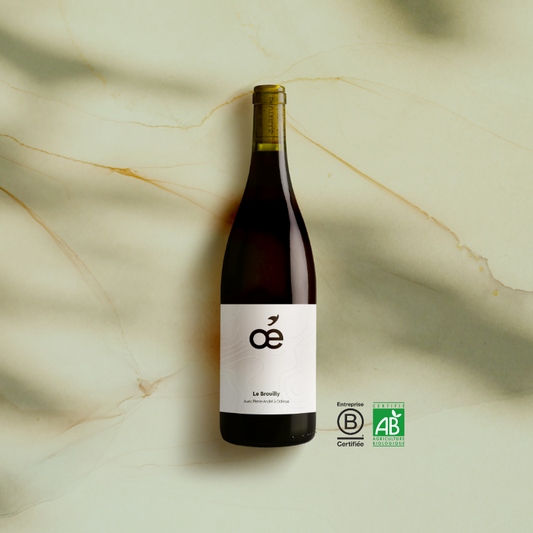Organic wine is not necessarily more expensive than conventional wine . “ I know this theory ” would tell you Noël Flantier (referring to OSS117), and he would be very wrong because more than a theory, it's a reality! Let's see it all together.
Why do we think that organic wine is more expensive?
It's true, it is often said that organic products are more expensive. Is this really the case? And above all, why should they be more expensive?
You probably know that well-known saying, “ time is money ”. You now have all the keys in hand to understand why organic wine is thought to be more expensive than conventional wine .
The specifications of conventional wines allow many techniques to accelerate and facilitate the process of making wine. From viticulture to winemaking , winemakers can resort to a whole host of “miraculous” nudges, not without side effects . By using chemical pesticides and phytosanitary products , winegrowers can protect and facilitate the growth of vines, to the detriment of soils and biodiversity which take a hit. The excessive use of chemicals certainly makes it possible to grow grapes with great ease, but it also destroys its environment . Many winemakers realize this year after year and, to the delight of mother nature, go back to more natural methods .

During vinification, it is also very easy to cheat, and as some would say, not seen, not taken! The specifications of conventional wines allow the addition of a large number of additives during vinification , which allows the wine to be corrected step by step. To produce mass wines, quality is often compromised in favor of quantity .
Making organic wine is another pair of sleeves because organic viticulture requires a particular requirement and attention. As our Oé winegrowers say , when you work with nature, you know she has the last word . Sometimes nature is lenient, sometimes it is capricious, you have to know how to deal with it and work with a lot of patience and precision. Natural techniques (Bordeaux mixture, horn dung, herbal preparations, etc.) are much more respectful of the soil and protect the vines more gently, which can reduce yield. To choose is to give up, and winegrowers in organic farming choose to risk the loss of part of their production so as not to damage nature . We don't know about you, but we love this state of mind!
Producers of organic wines generally have lower yields than those of conventional wines and are therefore sometimes forced to post slightly higher prices . This price difference may put some people off, but as we like to say at Oé, the ideal way to be healthy is to consume less and consume better !
In this article, we talk about sulfite-free wines
Do you have to pay for an expensive organic wine to have fun?
Now that we know why we say that organic wine is more expensive than conventional wine , we can wonder if organic products are necessarily excessively expensive. Well actually, not at all.
At your wine merchant , your grocer or on the internet , you can find everything, very expensive wines and very affordable wines. The price will not give you any indication of the viticulture and viniculture method used . It is not because a wine is expensive that it is organic, and vice versa, even if you are unlikely to come across a bottle of organic wine at 2 euros.
To be sure to buy organic wines , refer to the logos of the labels which are there to help you because they attest to the respect of the specifications on the part of the winegrowers . We talk about it in detail in this article . You can also seek advice from your wine merchant , your grocer and even chat with winegrowers who will be delighted to talk to you about their work and their wine.
Find the map of Oé's partner grocery stores, wine merchants and restaurants
In 2020, a bottle of organic wine cost on average 6.14 euros compared to 4.62 euros for a conventional wine , a justified price difference because the demand for organic wine is only increasing . Phew, the earth can take a breather and have hope!
More and more winegrowers are converting to organic viticulture or biodynamic viticulture , so the organic wine list is growing! Organic wines are more and more diversified with areas offering good entry-level bottles around 4 euros or 5 euros and prices can climb very high. For example, the Domaine de la Romanée Conti known for its great wines and having sold the most expensive bottle in the world (480,000 euros) is maintained biodynamically .
You can find everything among organic wines, and whatever your budget, you will have something to please you. From Grands Crus to thirst-quenching wines , there is a host of good organic wines just waiting to satisfy your palate. It's all about finding the price/quality ratio that suits you. You can just as well indulge yourself with a bottle for 5 euros as with a bottle for more than 100 euros. In any case, if one day you open a bottle of Romanée Conti , do not hesitate to invite us, we will be delighted to taste it with you!
Also experiment with private sales , auctions and wine fairs to find unique bottles of organic wine at discounted prices . The best wines sometimes hide where you least expect them!
We hope that thanks to this article, you know more about the price of organic wines , and why they are sometimes more expensive than conventional wines and all the possibilities available to you to fill your good cellar with organic wines .
At Oé we work all year round with our winegrowers to offer you good red wines , white wines and rosé wines , all organic , at fair prices and with the marked aromas of their terroir and their grape varieties .
Do you have a favorite vineyard ? You prefer organic Provence wines , organic Vaucluse wines , organic Bordeaux wines , organic Languedoc wines , organic Mediterranean wines or organic Côtes du Rhône wines .
Tell us about your best tastings and share your opinions on our wines by writing to us on our social networks and at our address hello@oeforgood.com !





